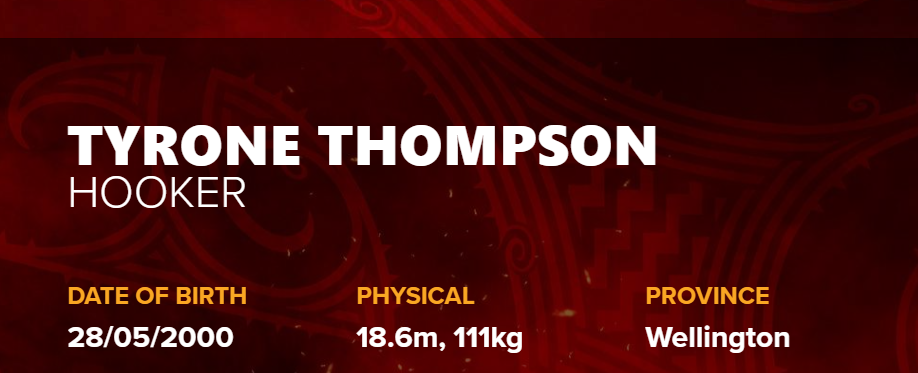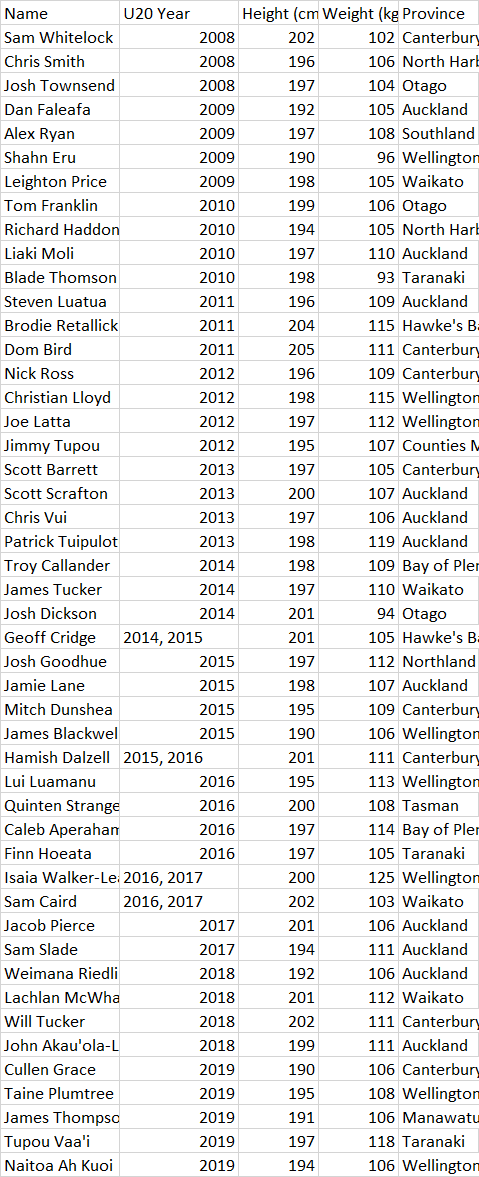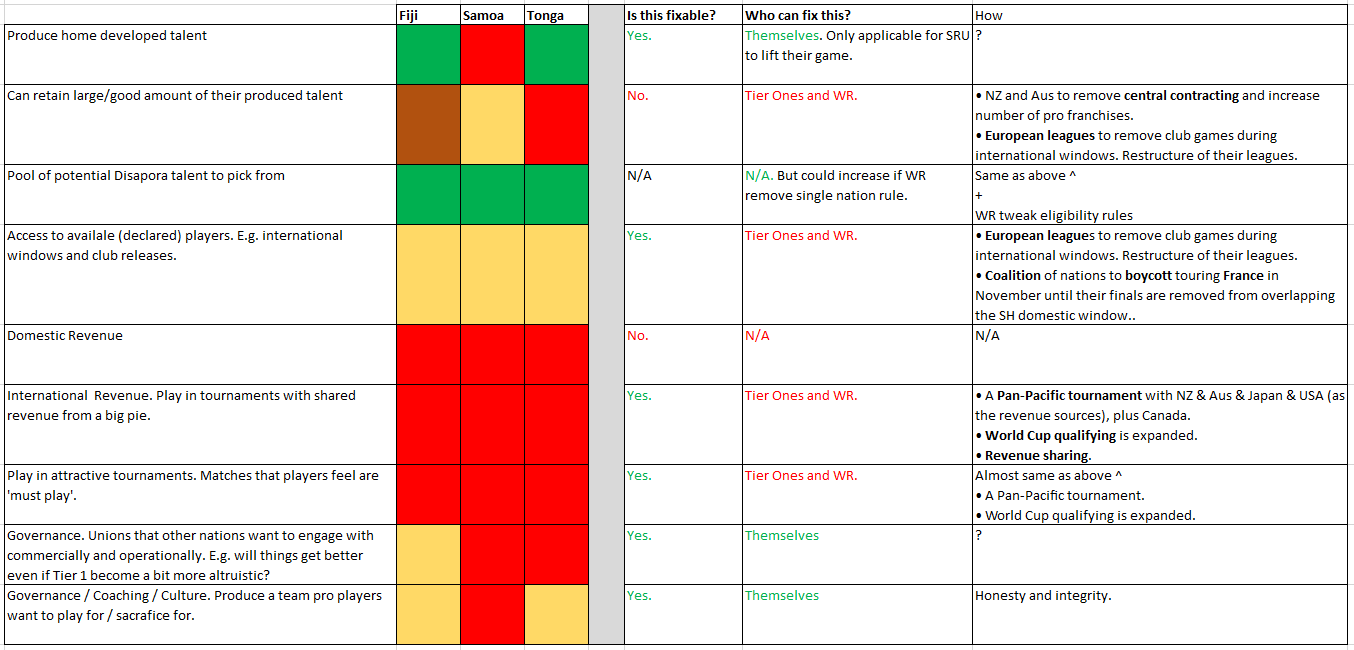@dan54 said in All Blacks depth 2022 & 2023:
@tim personally don't take a hell of a lot of notice of stats as 1; they tell you bugger all and 2; there are so many different ones for same matches that don't match up, you wonder how they get counted by different stats keepers!
I find it better to watch a game of rugby (preferably live) and take notice of how players go. . Watch how quick a player gets off ground to be available to part of next play whether attack or defence.. We actually did a bit of a look at stats when I was coaching, and as a coaching group found them pretty useless in working out how good a player was. For tackles for instance, you could see a player had attempted and made say 6 tackles, but unless stats actually tell you if they were in a position to make difference etc doesn't help all that much, or whether the player actually had to move far to make tackles etc. They good for Joe Bloggs who doesn't really watch the game as a rule, but would never use tham as a tool for picking a team.
I'm a data analyst, so I have to defend the use of stats, or I couldn't have any professional pride - albeit the defense will be closer to a muddled collection of thoughts, rather than a well laid out argument. But, aside from that, I also believe they are of huge value in most areas of life, particularly sport. Though I think it is important to note that we don't necessarily see a lot of the more important stats - though they are likely still collected and circulated to the coaching staff).
Our memories are far from perfect. We can't possibly process all the information we experience, so we use a bunch of shortcuts, which are usually pretty useful. However, these lead to a whole bunch of biases and flaws e.g. confirmation bias, where one looks to confirm information they already believe. The result being that intelligent, informed rugby viewers can see the same game, but come out with different opinions. Stats are an objective alternative that can be used in situations where people might disagree - e.g. if some people think Akira Ioane is lazy, and others disagree you can find stats to resolve this including tackles made, rucks hit, turnovers won, metres run without the ball and compare to other players in a similar position.
At some of the sport analytic conferences I've been to, the sport stat providers talked about how they had their own analysts who'd look at how closely particular stats would predict a win. They'd then try to market these to the sports writers/reporters... however, the reporters weren't really interested in going beyond the usual information we see (e.g. metres gained, tackle breaks). Which is probably why that's all that is available online. I know for AFL they record stats on 300 different areas, and I imagine it would be similar for rugby. So I agree, tackles made isn't a particularly informative stat on its own, but that doesn't mean that stats are useless - just that 'tackles made', on it's own, is not particularly useful. You could, for example, measure how fast it takes for each player to get off the ground, or how long it takes the halfback to get the ball into the hands of his 10. Sport stats providers can probably also do this more accurately than a coach with a clipboard can.
I'm also not sure if it necessarily matters that different companies come up with different stats for the same game. It is possible/probable that some of the more popular companies (e.g. Opta) worked with rugby teams to define what was considered a tackle, and have some strong in-house criteria, that might differ from other companies. Personally, as long as they'd consistently end up with similar figures after recording a game multiple times, it wouldn't bother me that they end up with different results to other companies.
Additionally, there is a popular quote in statistics that goes 'All models are wrong, but some are useful'. The concept being that you'll never perfectly predict an outcome, but if you can predict it very closely then that is really all you need for a model to be useful. I'd say that it a similar idea is useful when considering rugby stats - or even most stats. 'All data is wrong, but some is useful'. They may not perfectly match what happened, but it doesn't mean they can't be useful e.g. if it was found that the Opta's output for percentage of tackles made that were dominant predicted the number of turnovers won, which in turn, predicted the likelihood of a team winning, then the error in this measurement doesn't worry me too much as, even with the error, I have something that could be used to predict future performance.
A real world analogy might be an organisation predicting NZ's population. Maybe this organisations prediction is 10,000 people out, due to a proportion of the population being 'hard-to-reach', and little information existing about them. However, if this organisations prediction of NZs population went up over 5 years, you'd still expect there would be more people in the country, and it might be worth making sure that there was infrastructure there to deal with this increase in population.
I know of at least one prominent rugby team that had their own formula for working out a players impact on defense that included tackles made, the number of dominant tackles, the time the player took to get off the ground, and they believed this was an important part of their success - so stats are definitely valued by some professional coaches. A lot of sports teams in America have found that there is huge value in recording all sorts of different stats, and have whole teams dedicated to interpreting and modeling them - I think some sports are a little better suited to this than rugby, but I wouldn't think it'd be any less relevant in rugby than in American football.
In general, I think you'd want to combine all of the information you have available, and consider all of. Do your own personal views seem to be reflected in the data? If not, why? Is it because the data is inadeuqate, or is it because your views are wrong? I'd expect that coaches would be integrating their thoughts from watching games with training results, stats, intuition to form a complete picture. I guess it'd be similar to a crime scene - forensic evidence is probably the gold standard. Having DNA that links a killer to a crime is hard to argue with. However, if every single witness says that perpetrator was female and your DNA evidence was from a male, you might want to look at it a little more closely.
You can probably view it as pieces of a puzzle that we will never completely finish. With both data and a coaches insight, you can fill in more of the puzzle then just data or a coaches view alone.






